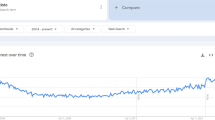Abstract
Search analytics and trends data is widely used by media, politicians, economists, and scientists in various decision-making processes. The data providers often use sampling when calculating the request results, due to the huge data volume that would need to be processed otherwise. The representativity of such samples is typically assured by the providers. Often, limited or no information about the reliability and validity of the service or the sampling confidence are provided by the services and, as a consequence, the data quality has to be assured by the users themselves, before using it for further analysis.
In this paper, we develop an experimental setup to estimate and measure possible variation in service results for the example of Google Trends. Our work demonstrates that the inconsistencies in Google Trends Data and the resulting contradictions in analyses and predictions are systematic and particularly large when analyzing timespans of eights months or less. In our experiments, the representativity claimed by the service was disproved in many cases. We found that beyond search volume and timespan, there are additional factors for the deviations that can only be explained by Google itself. When working with Google Trends data, users must be aware of the marked risks associated with the inconsistencies in the samples.
Access this chapter
Tax calculation will be finalised at checkout
Purchases are for personal use only
Similar content being viewed by others
Notes
- 1.
- 2.
- 3.
There is a discussion thread at Google support: https://support.google.com/google-ads/thread/8389370?msgid=26184434 (accessed 17.07.2020).
- 4.
https://mangools.com/blog/kwfinder-top-questions/ A direct retrieval from Google Ads was not possible for us since Google only provides very rough figures such as “10,000–100,000” by default - only larger advertisers receive more precise data.
- 5.
For April 16, 17 and 18, 2020 there are 35 query results each, which have the Google index value 0 for each hour. The corresponding timespans were, therefore, not considered in the analysis.
References
Aguilera, A.M., Fortuna, F., Escabias, M., Di Battista, T.: Assessing socialinterest in burnout using google trends data. Soc. Indic. Res. (2019). https://doi.org/10.1007/s11205-019-02250-5
Alsmadi, I., Al-Abdullah, M., Alsmadi, H.: Popular search terms and stock price prediction. In: Big Data 2019 (2019)
Cervellin, G., Comelli, I., Lippi, G.: Is google trends a reliable tool for digital epidemiology? Insights from different clinical settings. J. Epidemiol. Global Health 7(3), 185–189 (2017)
Chumnumpan, P., Shi, X.: Understanding new products’ market performance using google trends. Australas. Market. J. 27(2), 91–103 (2019)
Connor, P., Sarafidis, V., Zyphur, M.J., Keltner, D., Chen, S.: Income inequality and white-on-black racial bias in the united states: evidence from project implicit and google trends. Psychol. Sci. 30(2), 205–222 (2019)
Crowson, M.G., Witsell, D., Eskander, A.: Using google trends to predict pediatric respiratory syncytial virus encounters at a major health care system. J. Med. Syst. 44(3), 1–6 (2020). https://doi.org/10.1007/s10916-020-1526-8
Höpken, W., Eberle, T., Fuchs, M., Lexhagen, M.: Google trends data for analysing tourists’ online search behaviour and improving demand forecasting: the case of Åre, Sweden. Inf. Technol. Tourism 21(1), 45–62 (2018). https://doi.org/10.1007/s40558-018-0129-4
Hu, H., Tang, L., Zhang, S., Wang, H.: Predicting the direction of stockmarkets using optimized neural networks with google trends. Neurocomputing 285, 188–195 (2018)
Huang, M.Y., Rojas, R.R., Convery, P.D.: Forecasting stock market movements using google trend searches. Empirical Econ. 59, 1–19 (2019). https://doi.org/10.1007/s00181-019-01725-1
Husnayain, A., Fuad, A., Su, E.C.Y.: Applications of google search trends forrisk communication in infectious disease management: a case study of covid-19 outbreak in Taiwan. Int. J. Infect. Dis. 95, 221–223 (2020)
Kinney, M.O., Brigo, F.: What can google trends and wikipedia-pageview analysis tell us about the landscape of epilepsy surgery over time? Epilepsy Behav. 103, 106533 (2020)
Kondo, K., Ishikawa, A., Kimura, M.: Sequence to sequence with attention for influenza prevalence prediction using google trends. In: ICCBB (2019)
Lee, K., Hoti, K., Hughes, J.D., Emmerton, L.: Dr google and the consumer: a qualitative study exploring the navigational needs and online health information-seeking behaviors of consumers with chronic health conditions. JMIR 16(12), e262 (2014)
Preis, T., Moat, H.S., Stanley, H.E.: Quantifying trading behavior in financial markets using google trends. Nat. Sci. Rep. 3, 1684 (2013)
Smuts, N.: What drives cryptocurrency prices? An investigation of google trends and telegram sentiment. In: ACM SIGMETRICS (2019)
Verma, M., Kishore, K., Kumar, M., Sondh, A.R., Aggarwal, G., Kathirvel, S.: Google search trends predicting disease outbreaks: an analysis from India. Healthc. Inform. Res. 24(4), 300–308 (2018)
Vosen, S., Schmidt, T.: Forecasting private consumption: survey-based indicators vs. google trends. J. Forecast. 30(6), 565–578 (2011)
Xu, Q., Bo, Z., Jiang, C., Liu, Y.: Does google search index really help predicting stock market volatility? Evidence from a modified mixed data sampling model on volatility. Knowl.-Based Syst. 166, 170-185 (2019)
Acknowledgements
This work is partly funded by the European Research Council under grant agreement 833635 (ROXANNE) and 832921(MIRROR) and by the Lower Saxony Ministry of Science and Culture under grant number ZN3492 within the Lower Saxony “Vorab” of the Volkswagen Foundation, supported by the Center for Digital Innovations (ZDIN).
Author information
Authors and Affiliations
Corresponding author
Editor information
Editors and Affiliations
Rights and permissions
Copyright information
© 2020 Springer Nature Switzerland AG
About this paper
Cite this paper
Behnen, P., Kessler, R., Kruse, F., Gómez, J.M., Schoenmakers, J., Zerr, S. (2020). Experimental Evaluation of Scale, and Patterns of Systematic Inconsistencies in Google Trends Data. In: Koprinska, I., et al. ECML PKDD 2020 Workshops. ECML PKDD 2020. Communications in Computer and Information Science, vol 1323. Springer, Cham. https://doi.org/10.1007/978-3-030-65965-3_25
Download citation
DOI: https://doi.org/10.1007/978-3-030-65965-3_25
Published:
Publisher Name: Springer, Cham
Print ISBN: 978-3-030-65964-6
Online ISBN: 978-3-030-65965-3
eBook Packages: Computer ScienceComputer Science (R0)





